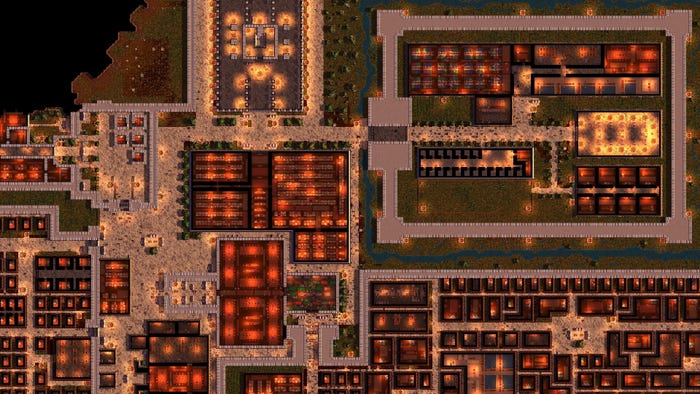
Featured Blog | This community-written post highlights the best of what the game industry has to offer. Read more like it on the Game Developer Blogs.
Organizing yourself when overwhelmed
When we feel overwhelmed, usually our work efficiency drops considerably. One of the best things to start with is to organize our work, no matter how much of it you have.

What do you do when you're overwhelmed by work? When you have so much on your plate that you don't know where to start from, usually you end up doing nothing for a while, trying to gather the courage to start anything. And then, when you finally start to work, it's not long before you can hear yourself thinking at all the other tasks you need to finish, instead of the one you're working on. This can go on and on, the end of the day hitting you as surprisingly as the arrival of Megan Fox at your door would. You haven't done even half of the things you were supposed to. And even that one thing that you knew you could finish in 2 hours in a regular day, it took you twice as much. What went so horribly wrong?
In project management, there is a very logical yet really hard to apply rule: don't give someone too much or too little work, otherwise his work efficiency will drop. What is too much or too little? That's for another article, but it depends mostly on the person that needs to do the work and how well you know him. But here's where it gets even trickier. You'd think that we know ourselves best, but how many times didn't it happen to start the morning thinking you'll do so many things and at evening you're far from accomplishing them?
Organizing is key
I'm not writing this to give you a fail-safe solution. I don't even have a solution. I'm just going to argue a bit how first trying to organize yourself can help your efficiency through the day.
No matter how much work we have, we tend to pick that one task that is first on our mind and jump head on into it. And that would be perfectly fine, if our brain could isolate all other issues and focus on only one thing at a time. But it can't, so it will start throwing questions at you. Is this what I should be doing now? Is this the most important thing I need to finish today? How much time will I invest in this? What if I can't finish it? How much time would task X or Y take me? Wouldn't I feel better if I finished task Z first? Should I get a coffee? I promised mom I'd call today!
Prioritize
First of all, call your mom, she loves you! That's one thing that you finished in mere minutes that won't be on your mind later. Then try to make a list of the things you need to work on today. Prioritize them. This is very important, even if you don't know for sure which task takes priority over which. Just ask you boss, your colleagues or decide for yourself, the important thing is to have these tasks put in the list ordered by their priority.
Estimate time
When you have the prioritized task list, make an estimate of the time each task will take you. Add somewhere around 20-25% more time to each task. I know you think you'll be very efficient and everything seems easier in the morning, but you won't and they're not. Everything tends to take more time, be it because it was harder than you first thought or because you had to answer a call, talk to a colleague, go in an unscheduled meeting, go to the bathroom, daydream about your hot wife/girlfriend/girl you'll never get and so on. The day is filled with many interruptions to your workflow and you need to prepare yourself for them.
Re-evaluate
After you have the list updated with an estimate of time for each task, it's time to re-evaluate your priorities. Some tasks need to be finished first, so leave those be, especially if your boss prioritized them or other people depend on them. But some tasks don't necessarily need to be finished first and they can take quite a bit of time to finish, or maybe it's questionable if you'll have time today to finish them at all. You can decide then if you can move those lower on the list and push up some shorter more obvious tasks. Getting more things done early and clearing them off your list and implicitly off your mind tends to do wonders. Not only you'll have less things to worry about, but you'll gain a confidence boost and a feeling of having accomplished something already. Even if all else goes bad, at least you'll have these things to show for today.
Check with the others
It's very important that after you've finished your list you show it to your boss and/or other people depending on your work, to make sure they agree with it. Cut from the list the things that are obvious you won't have time for today, just move them to tomorrow's list or in a bucket of todos. If you have a boss that doesn't agree with you cutting some tasks down and will try to motivate (to read persuade) you that you can do more or even all, then you should quit your job. Or prepare for overtime - please don't do that! I don't have a solution for your boss' bad management practices, but I have this advice: organizing your work is like buying stuff at the farmer's market, you don't negotiate how much you can do, because your decision to do less than he wants is based on how much you are able to do, not on how much you want to do. Make it clear that if by a miracle you'll have time for something else, you'll gladly work on that too, but otherwise this is the list of things you'll be able to work on today. And raise a flag for the tasks that you're not sure of completing from that list, pointing out the risk factors for them.
Lead first
Another important thing, that I delayed mentioning because it doesn't necessarily apply to everyone, is that if you are in a leading position, it's of the utmost importance that you make sure your team knows and understands what they have to do. That is number one task for you, each and every day. If they don't know what to do, they'll probably ask you at the wrong time, when you were focused on working on something and boom goes your work efficiency for the next half of hour. If they don't ask, first you should get worried because that's a bad signal for your leading efficiency, then you need to think that you waste both their time and your time trying to compensate for their lack of work. No matter how important your work is, tell them what they need to do today, even if that thing is to relax or to research or work on something of their free will. After that, it's helpful to make it clear when you'll be available for questions. This depends on your leading credo, but in my experience, being available for anyone anytime implies that it will be almost all you'll do during the day. If you need to do something else, it's good to have some kind of mechanism of zoning in without being interrupted by other people, at least for an hour at a time. After that, allocate some time for a Q&A session or to take the pulse of the team and check their progress. Then zone in on your tasks again and so on.
Conclusion
At the end of this process, you'll have a clear idea of the things you should do today and you'll have accepted the fact that most likely you can finish them all - it was your decision in the end, not something enforced by someone else. You also know the order in which to tackle the tasks and at any point in the day, you'll know how well you're progressing and can adjust your tasks list accordingly.
That's it, that's all the advice I have for now. Sorry for the long post, thank you for reading and please let me know your thoughts, be it if you agree or disagree!
Read more about:
Featured BlogsAbout the Author(s)
You May Also Like









